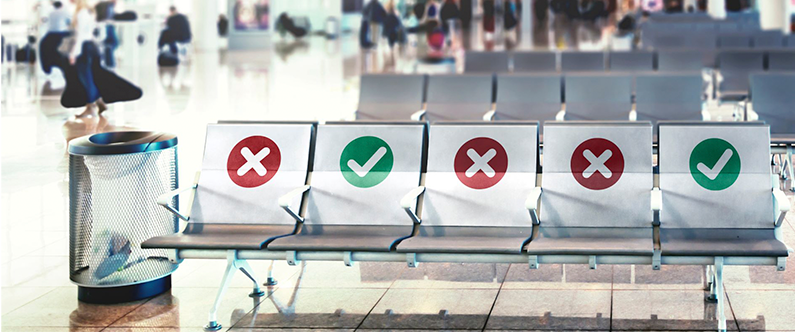Travel During the COVID-19 Pandemic
 Take measures to minimize your risk of infection when traveling during COVID-19
Take measures to minimize your risk of infection when traveling during COVID-19
With the onset of COVID-19, several countries partially or completely halted international travel. After six to seven months of the pandemic, countries have now outlined plans to slowly re-open travel. Even as countries relax travel restrictions, it is important to remember that travel may increase your chance of exposure to COVID-19 and also risk transmission to others. Staying at home continues to be the best way to protect yourself and others from getting sick from COVID-19. If travel is absolutely necessary, there are measures that can be taken to minimize your risk.
If you are thinking about traveling abroad, consider the following:
- Is COVID-19 spreading where you’re going?
- Are you or your traveling companions at an increased risk of getting ill from COVID-19? Note that older adults and people of any age who have a a weak immune system or a serious underlying medical condition are at higher risk for severe illness from COVID-19.
- What is the current re-entry policy at the point of your origin? Make sure you are not in for major surprises on your return.
- Do you have contingency plans including insurance coverage in case you contract COVID-19 during your travel? People who test positive for COVID-19 will be required to isolate until they recover and are no longer considered infectious.
Do not travel if you are sick, or if you have been around someone with COVID-19 in the past 14 days. Do not travel with someone who is sick.
Exit and entry screening for countries include measures like temperature checks and checking for signs and symptoms (fever above 38°C, cough). These measures are being routinely practiced at all airports for your own protection and that of others. You may be asked to complete a form informing health authorities about your possible exposure to cases within the last two weeks. Travelers should follow the recommendations of the travel authorities regarding policies at the airport and of the airline for the flight.

#Protect yourself and others during travelIf you do travel then, protect yourself and others. Air travel requires spending time in security lines and at airport terminals, which can bring you in close contact with other people and with surfaces which are frequently touched. Though viruses and other germs in general do not spread easily on flights because of how the air circulates and is filtered on airplanes, it may be wise not to take any chances. Follow the basic hygiene tips given below.
- Wash your hands with soap and water for at least 20 seconds at periodic intervals.
- If soap and water are not available, use hand sanitizer that contains at least 60% alcohol. Cover all surfaces of your hands and rub your hands together until they feel dry. Carry your own sanitizer for the trip.
- Avoid touching your eyes, nose, or mouth.
- Avoid close contact with others. Keep at least 1.5m physical distance from others. However, physical distancing is difficult on crowded flights, and you may have to sit near others, sometimes for hours. This may increase your risk for exposure to the virus that causes COVID-19. Follow the advice of the airline you are traveling with.
- Wear a mask/cloth face covering at all times during the trip.
#Anticipate Travel Needs
- Carry enough alcohol-based hand sanitizer (at least 60% alcohol) and keep it within easy reach.
- Bring adequate masks/cloth face-coverings to wear in public places.
- Pack some non-perishable food in case restaurants and stores at the airport are closed.
- If you take any specific medication for a health condition, ensure that you have enough to last you for the entire trip.
Source: Centers for Disease Control and Prevention, World Health Organization
Contributors: Ms. Raji Anand, Dr. Sohaila Cheema and Dr. Sathyanarayanan Doraiswamy
Editing: Mr. John Hayward